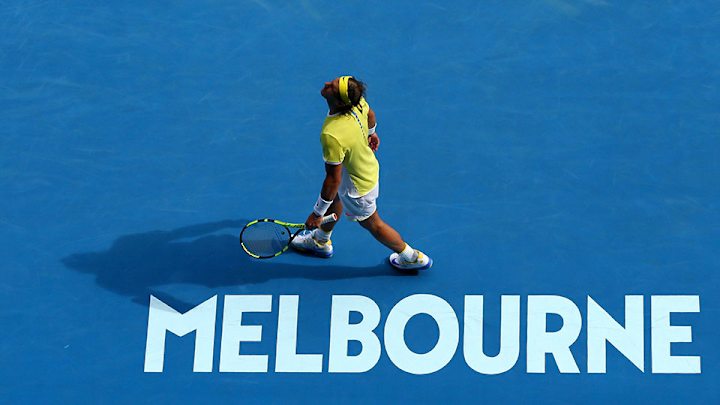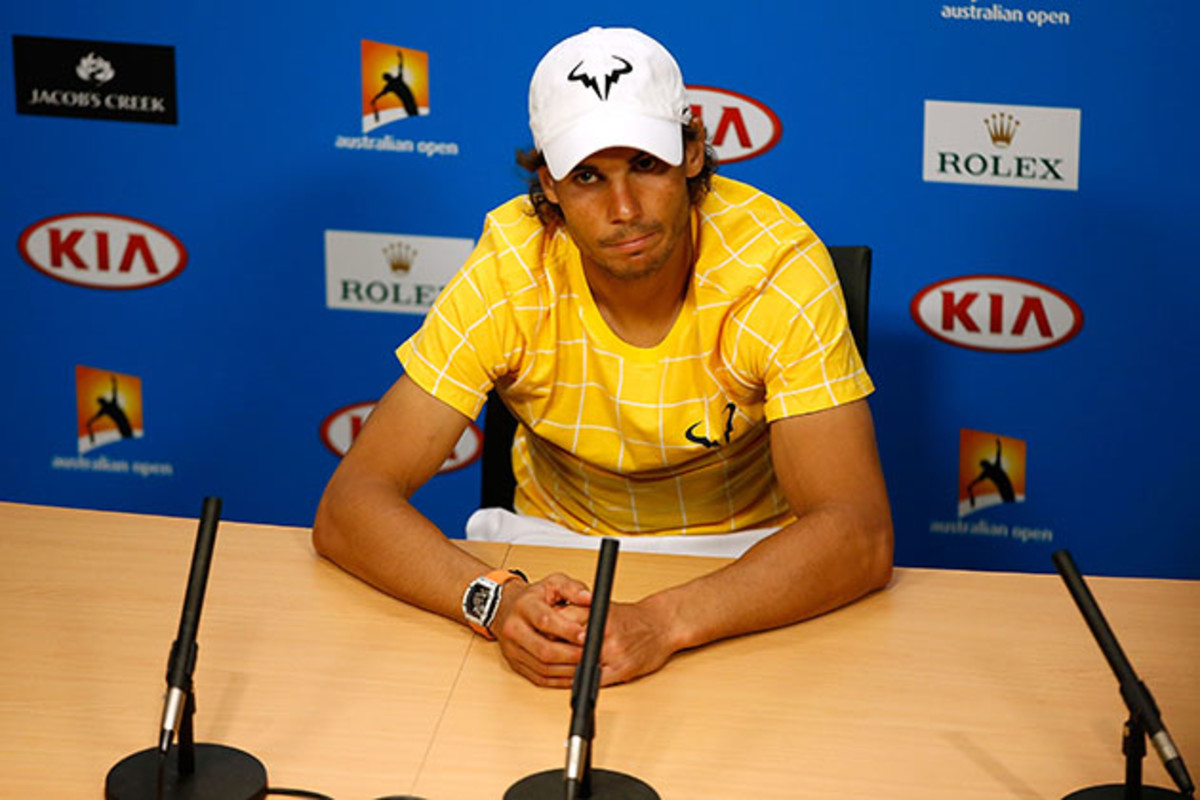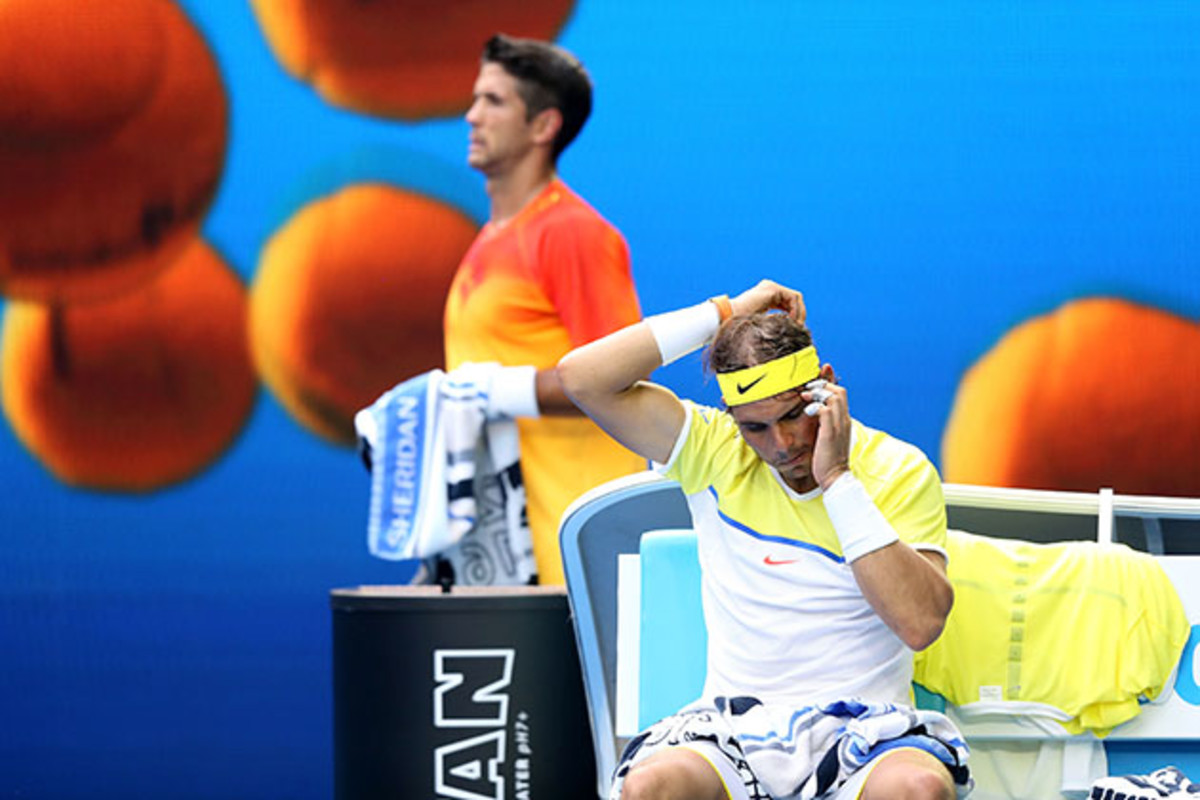Mouratoglou believes a slower Nadal has tough challenge ahead

MELBOURNE – It’s early 2016 but for Rafael Nadal, it feels as though 2015 is happening all over again. The Spaniard’s 7–6, 4–6, 3–6, 7–6, 6–2 loss to Fernando Verdasco in the first round of the Australian Open on Tuesday was the second first-round defeat of his career, the first coming at the hands of Steve Darcis at Wimbledon in 2013. After losing in the first week at the previous three majors, Nadal once again finds himself searching for answers.
“The match is a tough [loss] for me obviously…especially because is not like last year that I arrived here playing bad and feeling myself not ready for it,” he said after the loss to Verdasco. “This year was a completely different story. I have been playing and practicing great and working so much.”
No. 5 Nadal loses epic vs. Verdasco; Murray, Muguruza advance on Day 2
Nadal earned a two sets to one lead over Verdasco but was unable to close, even up 2–0 in the fifth set. Verdasco played superb tennis in the final set, winning the last six games of the match and finishing with 90 winners and 91 unforced errors, and his performance revealed one flaw of Nadal’s game that has let him down over the past year: the forehand.
“In terms of being competitive, I was competitive. In terms of creating damage to the opponent with my forehand, I didn't. So I was hitting forehands, and he was able to keep hitting winners,” Nadal said. “Cannot happen when I am hitting my forehand. The opponent, if he wants to hit a winner is because he take too much risk. In my opinion was not the case of today. I was hitting winners. I was hitting forehands. He was able to keep going for big shots in a not very bad position.

“That was the biggest issue for me today. I don't know 100% the reason, to be honest. I was doing that good on the practices and the previous tournaments.”
Patrick Mouratoglou has some ideas about the reason behind Nadal’s declining form. The Frenchman and current coach of Serena Williams has followed Nadal’s career over the last decade and knows first hand about the mindset of a champion. According to Mouratoglou, Nadal’s forehand issues are nothing new. The Spaniard’s biggest obstacle lies somewhere else.
“Rafael Nadal has always been a very anxious player who needs to win matches to be reassured. As long as he doesn’t win enough matches in a row, he doesn’t have the needed confidence for his shots to do their usual damage,” Mouratoglou said in an interview on Wednesday in Melbourne. “This forehand issue? We’ve seen it 50 times already. But we weren’t worried…. I feel like I’ve been talking for 10 years about how short he plays when he’s tight. And he was still beating top players this way because the guys were so scared and wouldn’t step up inside the court, and above all because of his extraordinary footwork.”
Mouratoglou believes Nadal has lost his ability to cover the court because of his footwork skills, and as a result, his confidence during matches has been affected.
“[A few years ago] when he wasn’t playing his best tennis, he would keep the ball in play aiming to the middle of the court and run. He’d put so much intensity and be impossible to hit through,” he said. “Today he can’t do that anymore because his footwork is so far from what it was before. He’s much slower. And he knows it.”
Mouratoglou says that’s why Nadal decided to change his game to a more aggressive style, a completely different method than he has used for the past 20 years. And while he has found success with this approach, Mouratoglou says, it is not natural for him to play far inside the court and when he’s not at his best, he stops moving forward.
Tennis' vulnerability to corruption, match-fixing lies in economics
“In the past he has only been aggressive when he was full of confidence,” Mouratoglou said. “Facing a Verdasco playing that well, he was getting stressed and so he stepped back. But we’ve seen it so many times when he’s not confident.”
After speaking openly about his struggles with confidence in 2015, Nadal reassessed his game with his coaches and seemed to find his form again late in the season and in his first tournament of 2016. But now, questions about his confidence still linger.
“How will he get his confidence back, knowing that he can’t count anymore on that court coverage?” Mouratoglou said. “That’s the only reason why one can wonder if he’s going to ever be back on top. He might be slower now because he can’t train as he used to do anymore, because he’s not getting younger and his body has already done a lot. Also it’s tough to think he’ll ever get his speed back. And the more stressed he is, the slower he’s going to be.”

Even his coach Toni Nadal is searching for explanations after his loss in Melbourne on Tuesday.
“To lose so early in Australia is one of the biggest disappointments we have had because, in the last four months, we had been playing well,” he said to Spanish radio. “I hope it’s only a blip and we move forward…It’s not easy to change of style after 15 years.”
Toni now even seems open to the idea of a team change. “I understand results come first and if you have to make a change, you have to do it,” he said.
2016 Australian Open Daily Data Visualizations
But Mouratoglou isn’t convinced. “It’s tough to see what the way for him is here, but it’s not even an option for him to stop working with Toni at this moment of his career. But if Toni wants to bring someone into their team, why not.”
Mouratoglou believes that if Nadal can win another Grand Slam title, it will be at Roland Garros. But he’s still unsure of the road to get there.
“Even if somehow he finds a way back to full confidence, I’m not sure he’d still beat [Novak] Djokovic. And getting back to this state of mind while you keep losing against Djokovic, it’s not easy,” Mouratoglou said. “If [Nadal] starts to think that he won’t ever be back then he’s going to stop playing tennis. If at some point he stops believing, he’ll stop. That’s not someone who’s going to hang in there between the fifth and 10th spot in the rankings. But he still believes he can. For how long, I don’t know. But the results will have to arrive quickly.”
